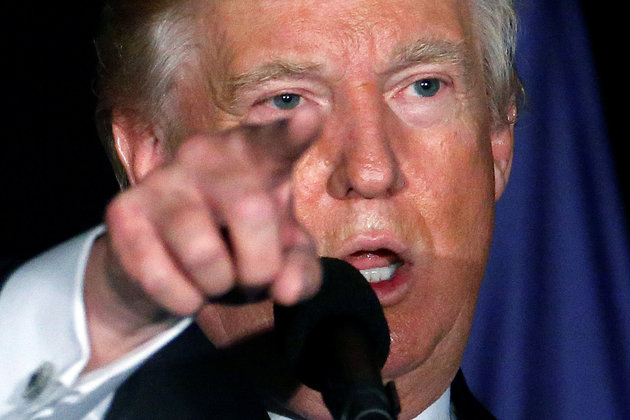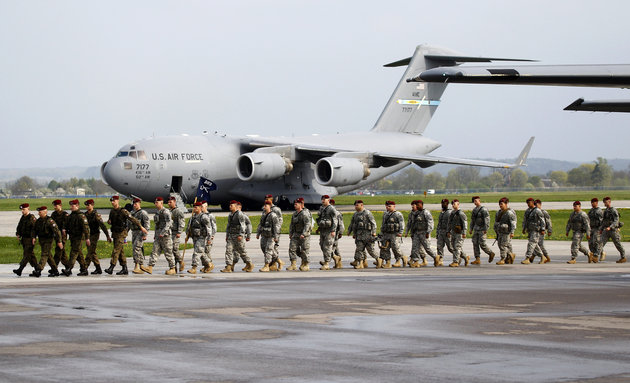
Donald J. Trump is causing some high anxiety inside the military.
He has suggested carpet-bombing Syrian cities, assassinating the families of Islamic State fighters and torturing detainees, all illegal under international or U.S. law. He has proposed withdrawing troops from South Korea (a similar troop withdrawal helped ignite the 1950 Korean War), advocated disengaging from NATO, and declared that Japan would be “better off” with its own nuclear weapons. And he has famously bragged, “I know more about ISIS than the generals!”
The U.S. military prides itself on scrupulous adherence to strict moral and ethical values. While some in the ranks may be passionate Trump supporters, for others, the idea of actually carrying out his more bizarre ideas is unthinkable.
“I cannot imagine active-duty troops doing what Trump is stating,” said Paul Eaton, an Army two-star general who resigned in 2006 in protest against Bush administration military policies. “I believe we would have outright defiance,” Eaton told The Huffington Post. Michael Hayden, a retired Air Force four-star general and former director of the National Security Agency, is even more blunt. Given an order to kill families of suspected terrorists, “the American armed forces would refuse to act,” he said.
Trump has fired back. “They won’t refuse. They’re not going to refuse me,” he boasted at a March 3 GOP presidential debate. “Believe me ― If I say do it, they’re gonna do it.”
Trump may be right. Despite its occasional disagreements with presidents and civilian officials, the military doesn’t have an especially proud record of refusing orders. Military officers swear an oath of allegiance to the Constitution, not to the commander in chief. Nevertheless, the top brass, despite deep misgivings about the conduct of the wars in Vietnam and Iraq, quietly went along with what the White House wanted. In 11 years of war in Vietnam, 58,220 Americans were killed; 4,520 Americans have died in the still-raging Iraq War so far.
“Do what’s right, legally and morally,” the Army instructs its soldiers.
-U.S. Army Doctrine, Army Values
The record suggests that the United States military, which takes pride in its strong professional ethics, nevertheless is no bulwark against military fiascos.
“It’s hard for military officers to disobey orders,” said Peter Mansoor, a historian and retired Army colonel who was the top aide to Gen. David Petraeus during the Iraq War troop surge in 2007-2008. “It’s a career-ending move that likely will get you court-martialed. One has to be willing to put one’s future on the line.”
The legal lines are clear. Waterboarding, used on detainees during the Bush administration as an “enhanced interrogation technique,” or torture, is illegal under international and now U.S. law. The deliberate targeting of war-zone civilians, whether or not they are related to ISIS fighters or other terrorists, is a war crime under international law.
Nevertheless, Trump has asserted that both are necessary and, if he’s president, would be part of his war on ISIS.
“You have to take out their families,” Trump said three times during a phone interview with Fox News last December, brushing aside the issue of civilian casualties as “political correctness.”
These and other Trump pronouncements may be impulsive bluster, but they clash hard against the military’s values of personal courage, honor, integrity and loyalty, among others. At its core, the military’s value system is its commitment to use lethal violence only when legally and morally justified.
“Do what’s right, legally and morally,” the Army instructs its soldiers. “Facing moral fear or adversity may be a long, slow process of continuing forward on the right path, especially if taking those actions is not popular with others.”

To a private, that might sound like an invitation to free thinking. After all, these values seem to enshrine the principle set forth in the founding charter of the Nuremberg war crimes trials of German military officers after World War II: “The fact that the Defendant acted pursuant to order of his Government or of a superior shall not free him from responsibility ... ” In short, “I was just obeying orders” is no defense of a war crime.
The harsh reality, however, is that an enlisted person can be court-martialed for refusing an order, illegal, immoral or otherwise. According to the U.S. Manual for Courts-Martial, “An order requiring the performance of a military duty or act may be inferred to be lawful and it is disobeyed at the peril of the subordinate.”
If that’s not clear enough, the manual explains that deciding whether an order is illegal or immoral is up to a military judge ― not the enlisted person, regardless of his or her “conscience, religion or personal philosophy.” Penalty: dishonorable discharge, forfeiture of all pay and allowances and prison for five years. In wartime, the penalty for disobeying an order can be death.
Two clear cases of principled disobedience stand out from the first Iraq war. Back in 1990, as U.S. forces were gathering to push Iraqi troops out of Kuwait, a 40-year-old doctor in the Army reserves and mother of three children was called up to active duty. Capt. Yolanda Huet-Vaughn opposed the war on moral grounds and refused to go. Charged with desertion, she was convicted at court-martial and served eight months of a 30-month sentence.
Bryan Centa, a 21-year-old Army private, refused on religious grounds to accompany his unit to the war. He was chained in leg irons and handcuffs, carried out of his barracks past hooting and jeering soldiers, bundled onto a military transport plane and sent to Saudi Arabia anyway.
Given those examples, it’s not surprising that disobeying an order is rare. Zachary Spilman, a former Marine officer who served as a judge advocate in Afghanistan, is now a civilian attorney specializing in military justice. “I’ve advised innumerable young Marines that you get to complain, and the boss gets to say, ‘I hear you, I disagree, my order stands,’” he said. “And at that point your duty is to salute and execute smartly.”
Officers have a bit more leeway. As Army doctrine puts it, officers are expected to serve honorably “under civilian authority while obeying the laws of the Nation and all legal orders; further, we reject and report illegal, unethical, or immoral orders or actions.”
So the officer corps operates under two potentially conflicting core principles: subordination to civilian control under the Constitution; and a requirement to do what is legally and morally right. How to respond when those conflict is an issue that concerns Army Lt. Col. Peter Kilner, who teaches ethics at West Point.
“I do sense a strong consensus that only an unethical decision that has strategic implications could justify disobeying our civilian leaders,” Kilner said, “because we have a moral duty to be subordinate to them. That said, I believe that a deeper, more universal moral principle is our duty to obey only moral and legal orders.”
The justifiable response to an illegal or immoral order, Kilner said, is to advise against it and explain why. “You always advise against an illegal or immoral order, that’s a given. But if the advice is ignored, there is a spectrum of response, based on how egregious the order is.” Those responses include putting your objections in writing, or resigning. The most extreme response, Kilner said, “is to say, ‘I will not allow this, I will make sure this doesn’t happen.’ I’m not aware of any military professional ever having to do this.”
“I am now going to my grave with that lapse in moral courage on my back.
-Gen. Harold Johnson, U.S. Army chief of staff, on his failure to oppose the Vietnam War
Of course, most questionable military orders don’t involve significant moral or legal issues. Most can be resolved by a smart junior officer who allows a commander a face-saving correction: “Hey, sir, did you really mean for me to take my platoon directly to Objective Alpha, because there’s a swamp on that route.” Or, “Firing on that village will cause civilian casualties, and I know you didn’t mean for me to do that, right, sir?”
Practically speaking, though, it hardly ever happens that military officers “reject and report” illegal or immoral orders as their oath demands, especially orders that carry immense strategic implications ― such as invading Iraq or carpet-bombing cities full of civilians.
Gen. Harold Johnson, the Army’s chief of staff from 1964 to 1968, deeply regretted having never opposed the decisions of President Lyndon B. Johnson and Defense Secretary Robert McNamara that deepened U.S. involvement in the Vietnam War. “I am now going to my grave with that lapse in moral courage on my back,” Johnson later lamented.
H.R. McMaster’s 1997 account of that period, Dereliction of Duty, which detailed the failure of other senior officers to stand up against Johnson and McNamara, was widely read across the officer corps in the years before the 2003 invasion of Iraq. “There was a deep bitterness over Vietnam and the way the [service] chiefs had been co-opted,” military historian Richard H. Kohn observed. “[Army officers] said, ‘We’re never going to put up with this again, we’re not going to be put in that position again by civilians.’”
But when the Bush administration and Defense Secretary Donald Rumsfeld began planning to invade Iraq with too few troops, no plan for occupation and no recognition that it would destabilize the region, only one senior officer resigned rather than take part. That was Marine Gen. Gregory Newbold. As director of operations for the Joint Chiefs of Staff, he was deeply involved in planning for the invasion and came to believe the operation was ill-considered and badly planned. He voiced his objections to his colleagues, and then quietly resigned.
It wasn’t until 2006 that Newbold finally aired his views publicly. A year later, in April 2007, he told Vanity Fair, “I should have had the gumption to confront him,” he said of Rumsfeld. “The right thing to do was to confront, and I didn’t.”
- Publish my comments...
- 0 Comments
